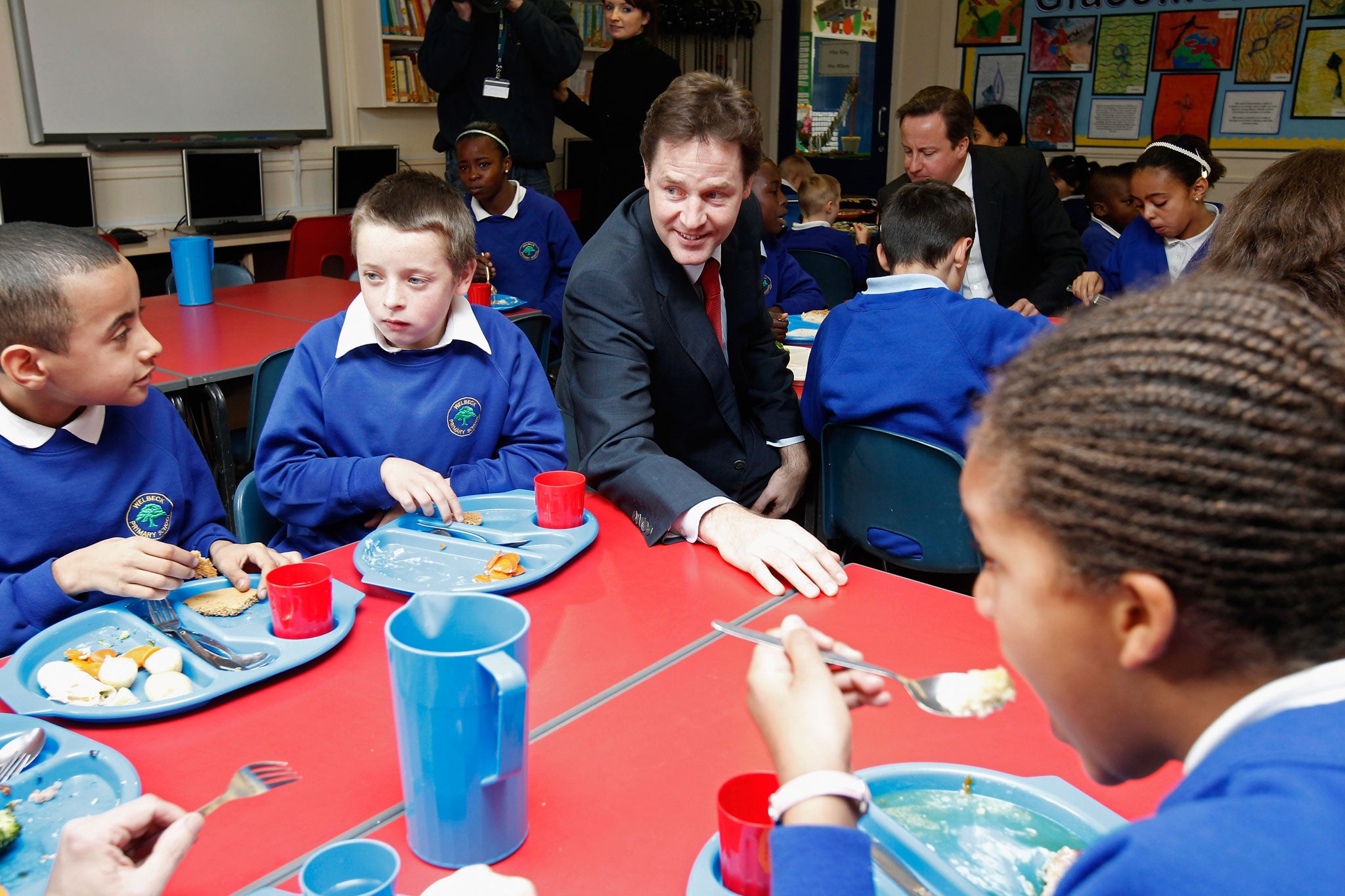Clegg’s free school meals plan may have some glitches, but who cares?
Both sides of this argument could go on until the next election


Your support helps us to tell the story
From reproductive rights to climate change to Big Tech, The Independent is on the ground when the story is developing. Whether it's investigating the financials of Elon Musk's pro-Trump PAC or producing our latest documentary, 'The A Word', which shines a light on the American women fighting for reproductive rights, we know how important it is to parse out the facts from the messaging.
At such a critical moment in US history, we need reporters on the ground. Your donation allows us to keep sending journalists to speak to both sides of the story.
The Independent is trusted by Americans across the entire political spectrum. And unlike many other quality news outlets, we choose not to lock Americans out of our reporting and analysis with paywalls. We believe quality journalism should be available to everyone, paid for by those who can afford it.
Your support makes all the difference.Of all the Whitehall departments, it used to be said, the Department for Education was the most “coalicious” – that is, the Conservative and Liberal Democrat ministers got on together the best. Sure, George Osborne and Danny Alexander have a ball at the Treasury, and the Department for Work and Pensions is dubbed the Department for Worship and Prayer because Iain Duncan Smith and his Lib Dem deputy, Steve Webb, bond over their common strongly held Christian beliefs. But the partnership of Michael Gove and David Laws, the Conservative Education Secretary and the Liberal Democrat schools minister, was the living embodiment of David Cameron and Nick Clegg’s Rose Garden bromance. This was a relationship that was sure to last the distance.
Yet, perhaps because the education of children is such an emotive area, this partnership is showing signs of collapse. Last year, Laws broke ranks with Gove over qualified teachers in free schools; then, earlier this year, they fell out over the sacking of Sally Morgan as chair of Ofsted. Most seriously, there were suggestions of differences over the policy to give the youngest schoolchildren free school meals, almost from the moment it was announced. But this week we have learnt how deep those differences are.
Dominic Cummings, Gove’s former special adviser, claims the £600m policy was viewed by DfE officials as a “bad gimmick” that had not been thought through at all before it was announced by the Deputy Prime Minister at the 2013 Lib Dem conference. It was done behind Gove’s back as a quid pro quo between Clegg and Cameron, in exchange for the Lib Dems agreeing to the Conservatives’ married couples’ tax allowance. Laws says Cummings is talking “utter balls” when he says that there was widespread opposition in the DfE. Officials had been researching the policy since 2009 and there are clear benefits for children’s health and attainment, the minister says.
Regardless of whose version you believe, it is clear that there are issues with the policy. Having first pledged that all 1.4 million five- to seven-year-olds in England would receive a free hot lunch, the Lib Dems have had to modify this to merely nutritious, rather than hot, because not all schools have on-site kitchens. There are also concerns about implementation, with head teachers this week alarmed that some children will have to eat at 11am, as part of staggered lunchtimes, or choose their meals two hours in advance. And there are worries about value for money, with Cummings claiming that the schools maintenance capital budget is being used to pay for free school meals.
This is somewhat rich coming from someone whose boss axed the Labour government’s Building Schools for the Future programme, but whatever. Both sides of this argument could go on until the next election, as they probably will, about the process, the budget, the implementation and the detail of this policy. It is true that universal free school meals was a flagship Lib Dem policy in exchange for a flagship Conservative policy, the marriage tax break. Given that both were designed with 2015 voters in mind, the key question for Cameron and Clegg, Gove and Laws, is this: are you in politics to make the lives of children better, through a healthy nutritious lunchtime meal; to reduce the stigma of free school meals, which are currently only for the poorest; to target any money there is at health and education; and to save families who have just come through the financial hell of paying for childcare? Or, are you in politics to fund couples who get married, while telling those who decide not to wed that the state does not want to support you? Because if universal free school meals is a gimmick, then it is a well-intentioned one that should be celebrated.
Twitter: @janemerrick23
Join our commenting forum
Join thought-provoking conversations, follow other Independent readers and see their replies
Comments